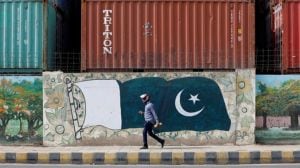Benazir146;s third coming?
Musharraf8217;s sudden loss of credibility gives her hope of hastening a return to Pakistan

As we watch with fascination the unexpected political defiance in Pakistan, a more consequential dynamic, with former Prime Minister Benazir Bhutto as the driver, has begun to unfold. With the sense of the big moment at hand, Bhutto is making her moves, fast and furious.
In deciding to skip an opposition gathering scheduled for this week in London, and announcing plans for her own agitation against President Pervez Musharraf, Bhutto is seeking to inject herself right into the middle of the political storm in Pakistan. Bhutto8217;s moves would surely fracture the rather fragile opposition unity against Musharraf; but they also might open the door for a potential compromise with the army that could help tide over the current political crisis.
Whatever the final outcome, Bhutto has once again reminded us that she remains Pakistan8217;s most important political force. Bhutto, who became the first woman prime minister of any Islamic country by heading Pakistan in 1988, was deposed by the army in 1990. She was re-elected in 1993, only to be ousted again in 1996. The Pakistan Muslim League, led by the other exiled prime minister, Nawaz Sharif, has been stung by Bhutto8217;s decision not to attend a conference of all opposition parties in London, originally scheduled for March 24 and 25.
In deciding not to personally attend the conference, Bhutto was distancing herself from the rest of the opposition and trying to improve her leverage with the army. She softened the blow somewhat by promising to send a 8216;high level delegation8217; of her party leaders to the London conference. Over the weekend, she went a step further by choosing to avoid the conference altogether and asking all her followers to stay put in Pakistan to lead the agitation against Musharraf. Even before the current trouble, triggered by the sacking of Pakistan8217;s Chief Justice Iftikhar Mohammad Choudhry and intensified by the attack against newspaper offices in Islamabad, there had been intense speculation that Musharraf and Benazir were close to a political deal.
It has been no secret that Benazir has been in talks with Musharraf for quite some time. It was also known that a mutually satisfactory agreement that could release her from legal persecution and get her party to cohabit with the army in a new power-sharing arrangement had been elusive. The context of those negotiations has begun to change amidst Musharraf8217;s declining credibility at home and the growing pressures on him from the Bush administration to do more on eliminating the Al-Qaeda and the Taliban.
On the domestic front, the immediate problem for Musharraf, and the source of the present controversy, has been to fix a smooth re-election for himself as 8216;president-in-uniform8217;. With the general elections for a new National Assembly due this year, Musharraf was toying with the idea of getting himself elected by the current legislature before its term comes to an end.
It was the concern that Judge Iftikhar Choudhry might not play ball in legitimising the process of 8216;re-electing8217; Musharraf that led to his ouster this month. As protests against Musharraf mount, he needs the support of at least one major force at home to lend him that elusive political legitimacy. This is where Bhutto comes into the picture.
Externally, the ominous signals from Washington that the Bush administration might be ready to consider a post-Musharraf future for Pakistan have given Bhutto an opportunity to represent herself before the American establishment. Writing in The Washington Post last week, Bhutto challenged the Bush administration8217;s principal assumption on Pakistan and suggested she could be the alternative.
8220;For too long, the international perception has been that Musharraf8217;s regime is the only thing standing between the West and nuclear-armed fundamentalists,8221; she said. 8220;Nothing could be further from the truth8230; The notion of Musharraf8217;s regime as the only non-Islamist option is disingenuous and the worst type of fear-mongering,8221; she insisted.
After raising expectations of fundamental change in Pakistan during the late 1980s and early 1990s, Bhutto had deeply disappointed her many supporters in Washington. Until recently few in Washington were willing to give her the time of the day. However, as Washington recognises that it cannot afford failure in Afghanistan and is frustrated at the inability of Musharraf to deliver on the Durand Line, it appears willing to look at other options, including Bhutto.
Washington8217;s new interest in Bhutto does not mean the US by any means underestimates the importance of the army, which is at the core of the Pakistani state. And in any case, the army remains the principal instrument for the US in combating the Al-Qaeda and the Taliban. Bhutto, too, is conscious that she cannot come to power and stay there without the support of the army.
For the US, it may be ideal to have the army and Bhutto working together, and with a measure of political legitimacy at home to strengthen the moderate forces in Pakistan and take on the Al-Qaeda and the Taliban. But Bhutto8217;s People8217;s Party and the army have never been natural allies. Mutual hatred, of course, has never stopped political alliances anywhere in the world. On the face of it, a deal has always been possible between Bhutto and the army. But the devil, as always, is in the detail.
Musharraf and the army have to swallow the bitter pill of conceding a lot more to Bhutto now than they would have had to a few months ago. Bhutto, meanwhile, has to balance the attractions of returning to power in Islamabad against the dangers of sharing it with the army, on an unequal basis, and being dubbed as the king8217;s party.
As mounting internal trouble and external pressure compel a rearrangement of the political pieces in Pakistan during 2007, India must be prepared for greater complexity and fresh uncertainty in dealing with our Western neighbour.
The writer is a professor at the Rajaratnam School of International Studies, Nanyang Technological University, Singapore
- 01
- 02
- 03
- 04
- 05






























